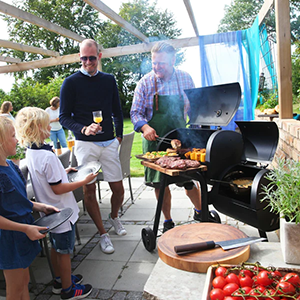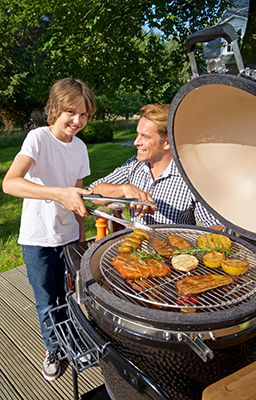Which is better: gas or charcoal?

For hundreds of thousands of years, wood (and later in some regions peat) has been the main fuel for preparing food. Charcoal was already being used at least 1,000 years before Christ. Coal-fired and coal-fired stoves only came into use sparsely in the 19th century. Gas and electricity first made their appearance in the 20th century. Perhaps therein lies an explanation for the fascination many people have with a “real fire.” Which brings me to the question of what fuel is best to barbecue with.
Worldwide, barbecue lovers are divided into two camps. On one side you have the charcoal burners, who insist that nothing beats charcoal or briquettes, and on the other side you have the gas burners, who swear by gas. These parties are usually diametrically opposed. Excellent results can be achieved with both fuels, and both coal and gas have specific advantages and disadvantages. On that basis, a neutral person can make the rational consideration of what will be the best choice for her or him personally.
That does not mean, however, that you should use only your mind. Barbecuing is done partly because it tastes good, but also because of the atmosphere that comes with it. Fire is undeniably a part of that, and stoking with charcoal awakens in many a primal instinct that burning with gas sorely lacks.
Although smoking can be mimicked with a gas grill with tools, this form of low & slow cooking is still a way of preparing food that actually calls for coal.
Advantages of gas
- With a gas barbecue, you can get started faster because you start the appliance with the push of a button. So you don’t need to light a fire to heat coals. After only about 10 minutes of preheating, you can start preparing the first food.
- The gas burners allow you to control the temperature very precisely, making it easier to achieve proper cooking.
- With a gas barbecue, you don’t have to deal with juices (grease) dripping onto glowing coals and can cause flaring flames.
- A gas barbecue does not involve coals, which means cleaning is a lot easier.
- Because with a gas barbecue you don’t start a fire, smoke is significantly less.
- It is also often stated that gas barbecues are healthier and more environmentally friendly. Healthier because fewer soot particles end up on your food and better for the environment because you pollute less air. Duly noted.
Disadvantages of gas
- An average gas barbecue is (considerably) more expensive to purchase than a charcoal barbecue. The differences in fuel costs (filling gas cylinder versus buying coal) are negligible.
- Gas barbecues cannot reach such high temperatures (max. 100 to 300°C.) as charcoal barbecues (400°C. and more). However, only plays if you are going to grill and even then is not really a miss.
- Gas barbecues are very large and take up a lot of storage space.
- Working with a gas cylinder requires extra vigilance regarding safety.
- Keeping a bag of extra coal as a spare is easier than keeping an extra gas canister, or you can more easily get a bag of coal somewhere at the last minute than gas.
- With a gas barbecue, you trade atmosphere for convenience.
Benefits of charcoal
- Charcoal barbecues are cheaper to buy than gas barbecues.
- You can achieve higher temperatures with a charcoal barbecue (applicable only when grilling).
- The atmosphere and experience of a charcoal barbecue is many times greater.
- Food from a charcoal barbecue has more flavor due to odor and smoke.
- Charcoal barbecues are usually (not always) smaller in size and easier to store. By the way, this does not apply to smoker barbecues.
- With a charcoal barbecue, it is much easier to prepare food by smoking as well.
Disadvantages of charcoal
- It takes longer before you can start preparing food because you have to start a fire first (although that aspect is actually seen by many as part of the charm).
- Controlling the proper temperature requires more work and attention.
- Coal leaves ugly stains, so be careful with clothing.
- A charcoal barbecue is dirty to use and requires more cleaning.
- Burning a charcoal fire produces smoke and can be a nuisance to the surrounding area.
Putting price aside for a moment, notions of speed, ease of operation and less junk argue in favor of a gas barbecue. Ideal when you come home during the week, want to eat outside in the garden and quickly grill a steak or chops. On the other hand, if you have a nice dinner with friends on the weekend, where atmosphere, experience, smell and taste are paramount, then the charcoal barbecue is the obvious recommendation.







